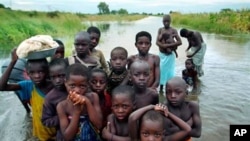A new U.N. report says the earthquake in Haiti and heat waves in Russia made 2010 one of the deadliest years in at least two decades. The report issued by the Belgium-based Center for Research on the Epidemiology of Disasters finds nearly 300,000 people lost their lives in more than 370 natural disasters last year.
The report notes most of the deaths last year resulted from the devastating earthquake in Haiti, which killed nearly one-quarter of a million people. The second deadliest disaster occurred in Russia where a heat wave in the summer of 2010 caused about 56,000 fatalities in the capital, Moscow.
The report says natural disasters, which affected more than 200 million people resulted in economic losses of nearly $110 billion. Most of these losses occurred in wealthy countries where expensive buildings and infrastructure were destroyed and damaged.
Center for Research on the Epidemiology of Disasters Director Debarati Guha-Sapir says for the first time last year, the Americas headed the list of the world’s worst-affected continents.
“The largest share of the pie is from the Americas, north and south America. Essentially again this is due to Haiti, but it is also due to Chile," said Guha-Sapir. "The Americas generally do not top the list of people dying from natural disasters, but here in this year they do ... Europe remains second in the share of the pie, largely because of heat waves. Heat waves has been one of the most important contributor to deaths in Europe, keeping it always at a very high rank.”
The Report says Asia experienced fewer disaster deaths than the Americas and Europe in 2010. Nevertheless it remains the highest affected continent, with nearly 90 percent of all people affected by disasters living in Asia.
Among the list of top 10 disasters with the highest death counts, five occurred in Asia. The report notes an earthquake, landslides and floods hit China, massive floods devastated Pakistan, and Indonesia was struck by a powerful earthquake.
Guha-Sapir says the largest economic losses often do not correspond with the largest loss of lives. She notes Haiti, where an earthquake last January killed more than 220,000, suffered losses of about $8 billion.
In comparison, she says the costliest event in 2010 was the Chilean earthquake, which killed 562 people and caused $30 billion in disaster damage.
“And, that is because of the fact that lives are not insured. That is where most of the economic losses data comes from insurance. So, lives are not insured, property is not insured and 225,000 people dead in Haiti essentially counts for nothing," stated Guha-Sapir. "We do not take into account the fact that mothers have died, people who earn the living of the family have died, that does not enter the economic loss estimates.”
U.N. officials say countries must take preventive measures now. Otherwise, they warn more disasters due to unplanned urbanization and environmental degradation will occur in the future.
The officials say weather-related disasters are sure to rise in the future, due to factors that include climate change. They urge governments to incorporate climate change adaptation in their urban planning.
2010 Deadliest Year for Disasters in Two Decades




